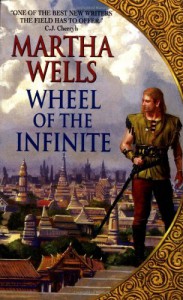book reviews forevermore
Goodreads refugee and wordpress blogger
“The more I read, the more I acquire, the more certain I am that I know nothing.”
― Voltaire
Wheels

A woeful number of fantasy readers are unfamiliar with Martha Wells. My proof, you ask? The very fact that rights have reverted back to Wells and she has decided to re-release her books in e-book form. Wide-ranging in world-building and focus, she hasn’t been content to settle down in one fantasy universe and write an endless series (cough, cough, Robert Jordan). I happen to love her fine balance between plotting and world-building, and the way she winds them together with reasonably sophisticated–but non-purplish–language. I’m a little regretful that it took me so long to discover her writing despite my wide-ranging fantasy tastes, and I’d encourage any fantasy reader to check her work out–there’s certainly enough variety that if one book doesn’t suit, there’s likely another that will fit better. And if nothing else, her take on fantasy tends towards the unusual.
Wheel of the Infinite centers on Maskelle, a formerly powerful woman who has left her position as her temple divinity’s living Voice in disgrace. Tet in a society somewhat loosely based on Tibetan Buddhism, there is a pantheon of gods who have spent time on earth and have returned to the Divine Realms. A core ritual of the combined temples is to recreate the mandala pattern of the lands annually or the land will suffer, and this year marks a crucial hundred-year ceremony. Although Maskelle retains many of her powers from her time as the Voice, she’s been traveling incognito, acting as seer for a traveling theater troupe. While looking for herbs, she discovers a river inn overrun with raiders. Feeling rather ornery, she decides to see if there are any honest folk left to rescue, and she instead discovers a foreign traveler captive to the bandits’ amusements. They mutually rescue each other, discovering an immediate connection. He surreptitiously follows as she leads the troupe to the capital city of the Celestial Empire, until a temporary rouse as her bodyguard leads to a permanent association. Once in the city, Maskelle, her new bodyguard Rian, and the troupe quickly become the focus of local politics, both supernatural and corporeal.
As I read, I was strongly reminded of Paladin of Souls, Lois McMaster Bujold’s 2004 award-winning fantasy novel centered around an older woman, long past her enthusiastic and athletic youth. It was clear that Wells had a similar agenda for Wheel, first published in 2000. In an interview at Tor books, Wells states, “for Maskelle I wanted to write about an older woman protagonist because I’d been thinking a lot about the portrayals of older women in books and movies around that time. I’d seen an older movie that dealt explicitly with the idea that when women reach a certain age, we’re just supposed to retire from life, especially any kind of a sex life. So I wanted to write an older woman who was very much still a force in the lives of people around her. I’d already done that with Ravenna in The Element of Fire, but I wanted to get more into it with a main character.”
Are there some problems here? Yes. It didn’t feel like the same polished writing I encountered in Death of the Necromancer, a fast moving 19th century supernatural murder mystery. While I appreciated the nominally non-Western focus and the general female equality, the world-building wasn’t as sophisticated as in The City of Bones. The relationship between Maskelle and Rian was rather predictable and not especially well developed, but I did enjoy the easy way they related without a lot of interpersonal strife. I enjoyed Maskelle’s snarky voice, although I wasn’t entirely sure it was culturally congruent until much farther along in the story. Wheel‘s plotting moves quickly, the characterization is decent, the romance enjoyable without overwhelming the main story and the ending was truly unpredictable. The inclusion and characterization of the theater troupe was a particularly strong aspect, especially the indirect commentary on the role of theater in the community. And the puppets!
Overall, I enjoyed the read, pleased I was exposed to yet another strong entry in Well’s interesting body of work. If you are considering it, check out the first chapter at her site.








 15
15
 10
10